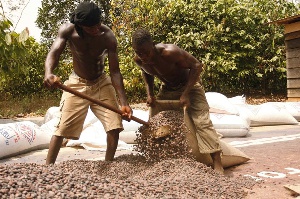Ghana, the world’s second-largest cocoa grower, is worried about the slow pace of growth in the volume of certified cocoa beans produced in the country.
According to the Minister of Finance and Economic Planning, Dr. Kwabena Duffour, “This symbolises the practical challenges associated with the processes in securing the licence as a certified cocoa grower. ”
He explained that emerging developments from within the global cocoa economy point to increasing consumer preference for certified cocoa beans.
“This offers producing countries the opportunity to expand the scope of certification to cover more growers and increase production in consonance with the current and future demand. ”
Dr. Duffour was addressing participants at a two-day national cocoa stakeholders’ conference in Accra on the theme “Partnership for Cocoa Sustainability”, organised by a non-governmental organisation, West Africa Fair Fruit (WAFF).
Also, he added, there are no clearly-defined stakeholder responsibilities for certified cocoa in the supply-chain in relation to the rules of the Federation of Cocoa Commerce (FCC).
“Therefore, specific roles with responsibilities assigned to the respective stakeholders need to be well-defined to fit into FCC rules to encourage collective acceptance. ”
Cocoa certification was introduced in Ghana by Fairtrade, which certified farmers of Kuapa Kokoo Limited. Rainforest Alliance and UTZ also later introduced their certification brands with farmers of Cocoa Abrabopa Association. The third certification scheme is the organic certified label.
Within the last couple of years, cocoa certification bodies have gradually amplified consumers’ calls for greater transparency in the cocoa supply-chain.
Their message, supported by the processing industry, has successfully generated considerable interest within the global cocoa economy.
Dr. Duffour, whose speech was read by Mike Owusu-Manu, the technical advisor in-charge of cocoa affairs at the Ministry of Finance, disclosed that the Alliance of Cocoa Producing Countries (COPOAL) is in the process of developing a certification standard for its member-countries.
This, he said, will involve a system of harmonising cocoa certification schemes across the different countries, and providing a platform where a COPAL certification standard/scheme will be developed, to achieve market equilibrium -- taking into consideration the different national and international standards on cocoa trade and food safety as well as other market fundamentals.
The member-countries of the Alliance account for approximately 75 percent of total world cocoa production.
There are currently 10 member-countries: namely, Brazil, Cameroon, Côte d'Ivoire, Dominican Republic, Gabon, Ghana, Malaysia, Nigeria, Sao Tome and Principe, and Togo.
The Regional Cocoa Programme Manager of the West African Fair Fruit, Cyril Ugwu, said the certification of cocoa production is one of the sustainable instruments employed in the cocoa supply-chain culminating in large-scale certification, which has been taken up by some cocoa grinders including Cargill, ADM and Petra Foods.
He urged Ghana to strategise to compete with the fast-growing 50 producing countries in the world, who now advertise their produce on the traceability portals of standard systems for easy sourcing by processors.
In the previous cocoa season, chocolate-maker Cargill paid an extra US$2. 2million directly to 26,500 farmers for 20,000 metric tonnes of UTZ and RA certified cocoa in Cote d’Ivoire.
General News of Monday, 21 November 2011
Source: BFT
Duffour worried about uncertified cocoa beans
Entertainment












